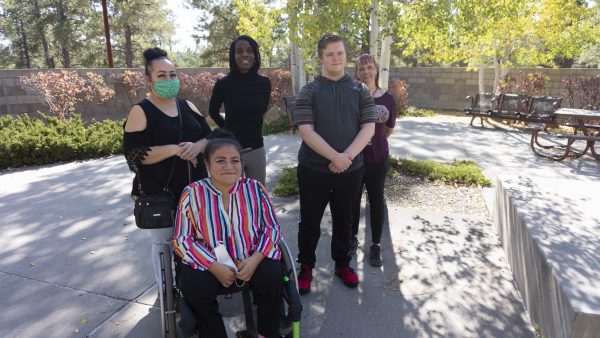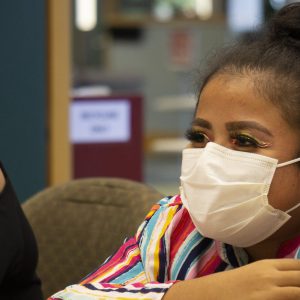The Institute for Human Development (IHD) at Northern Arizona University was recently awarded a five-year, approximately $2.5M grant from the United States Department of Education, Transition and Postsecondary Programs for Students with Intellectual Disabilities (TPSID) to develop and implement a radically-inclusive support and coaching program for students with intellectual disabilities (ID) to attend postsecondary educational institutions throughout Northern Arizona.

Knowing that better educational opportunities and experiences for students with ID will enhance and enrich the educational experiences of all students, IHD personnel developed and implemented a collaborative pilot project this past year. The pilot, funded by Arizona’s Developmental Disabilities Planning Council (ADDPC), supported four students with ID at Coconino Community College. Witnessing both the success and interest level generated by the pilot, project leaders decided to expand the reach of the project, recruiting partners from across Northern Arizona—along with state and tribal leadership—to jointly support a proposal for federal funding to increase the number of students with ID who attend college after high school.
“Inclusion on college campuses means that all students are supported, those with disabilities and those without. Everyone benefits from students with disabilities learning in the same classroom as the rest of the community,” explains IHD Executive Director and Principal Investigator Kelly Roberts. The project, Supporting Inclusive Practices in Colleges (SIP-C), is a collaboration with school districts, community colleges, and four-year universities to ensure positive outcomes for students. Additionally, various state agencies within Arizona’s Department of Economic Security, tasked with helping students with ID transition out of high school, are also engaged.
The project involves implementing a comprehensive, multi-component support network for students that includes professional development for postsecondary education staff as well as dedicated educational coaches and student peer mentors for student with ID. “One of the tenants of our program is that we want students to ‘use the front door first’ whenever possible, which means that students will be coached to access existing resources first before requesting extra supports from the academic institution they attend,” explains Sakénya McDonald, the Project Coordinator. “At its core, the project uses ‘person centered planning,’ ensuring that each student is supported as they pursue their own self-determined goals. Students with ID should be in the center of their circle of support, always present and leading the way,” concludes Ms. McDonald.
This award demonstrates the importance of successful pilot projects for securing increased funding. “ADDPC’s pilot funding permitted IHD to leverage our success with a small group of students into a huge opportunity that will touch so many lives,” concludes Dr. Roberts. ADDPC will also remain a partner on the larger project.
Including committed matched funds, over $3.3M is coming to support youth with ID to attend college in Northern Arizona in the next five years!
About the Institute for Human Development
The Institute for Human Development is home to a wide range of interdisciplinary programs, efforts that support its mission of facilitating ongoing improvements in access, attitude, and inclusion for people with disabilities. IHD, which celebrated its 50th anniversary in 2017, is one of the nation’s premier centers focused on promoting full inclusion by advancing attitudes that value persons with disabilities and enhancing access to all aspects of the human experience. IHD is a dynamic, multi-faceted environment staffed with faculty and professionals representing a range of human service disciplines and offering a broad spectrum of resources and programs for both NAU students and members of the community.



